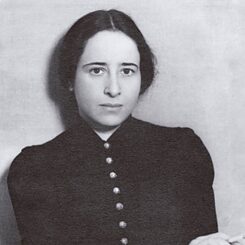Hannah Arendt and Aesthetic Judgement
Concert and Keynote (Wed./Thurs.) location is the McClintock Choral Rehearsal Room.
Accompanying the rise of authoritarian political movements across the globe in the last decade has been renewed public interest in the political philosophy of Hannah Arendt (1906–1975). Her critique of totalitarianism, provocative thesis on the “banality of evil,” and full-throated defense of the democratic public sphere have retained their value in the decades since she first proposed them. What has received far less attention is her consideration of the relationship between politics and the arts and listening, particularly as they are connected by the human faculty of judgement and the development of common sense. An international group of scholars and artists will gather for a workshop on the role of music, art, and political judgement in resilient democracies.
In addition to the scholarly presentations, the event will launch with a concert by a.pe.ri.od.ic, that will feature music inspired by and in dialog with Hannah Arendt’s aesthetics and the writings of Cecilia Sjöholm and Brigid Cohen.
Organizer: Ryan Dohoney (Music Studies, Critical Theory, Comparative Literary Studies)
Keynote Speaker: Cecilia Sjöholm (Södertörn University, Stockholm)
Keynote Respondent: Anna Parkinson (German, Gender & Sexuality Studies, Critical Theory)
Guest Ensemble: a.pe.ri.od.ic (Nomi Epstein, director)
Schedule:
Wednesday, May 18
7:30pm: Concert by a.pe.ri.od.ic with music by Yoko Ono, Antoine Beuger, et al.
Thursday, May 19
5pm: Keynote by Prof. Sjöholm with response by Prof. Anna Parkinson
Friday, May 20
9am–5pm: Presentations by Andrea Bohlman, Brigid Cohen, Susannah Gottlieb, Jonas Roenbrück, and Ben Steege with PhD student responses (Jean Gimble Lane, RCMA)
5pm: Reception
 Hannah Arendt
Hannah Arendt (14 October 1906 – 4 December 1975) was a political philosopher, author, and Holocaust survivor. Her contributions influenced 20th and 21st century political theorists.
Her works cover a broad range of topics, but she is best known for those dealing with the nature of power and evil, as well as politics, direct democracy, authority, and totalitarianism. In the popular mind she is best remembered for the controversy surrounding the trial of Adolf Eichmann, her attempt to explain how ordinary people become actors in totalitarian systems, which was considered by some an apologia, and for the phrase "the banality of evil". She is commemorated by institutions and journals devoted to her thinking, the Hannah Arendt Prize for political thinking, and on stamps, street names and schools, amongst other things.
Back